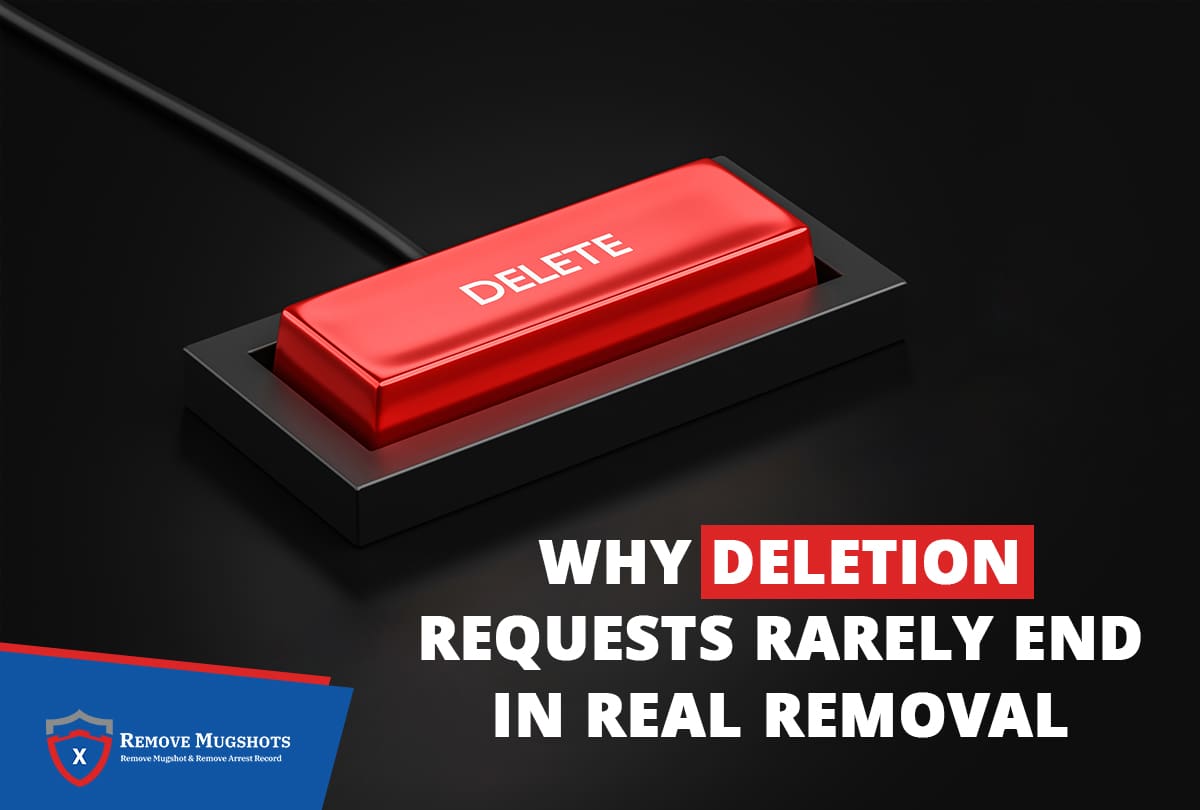Why Deletion Requests Rarely End in Real Removal
June 10, 2025 information removal

In a time where every search result can shape your reputation, many people assume that submitting a deletion request will make a damaging piece of online information, like an old arrest record, disappear. But here’s the reality: most deletion requests rarely end in real removal.
Suppose you’ve ever tried to get a mugshot or outdated background record removed from a site. In that case, you’ve probably discovered that clicking a “delete” button or submitting a formal written request is just the first step, not the solution. Whether you’re applying for a job, renting a house, or simply trying to move on from your past, the act of submitting a request is often met with delays, denials, or silence.
The Harsh Truth: Deletion Isn’t Simple
The internet doesn’t forget. Even when you make a formal request to remove something, that content may live on across multiple servers, backup systems, or mirror sites. And when it comes to arrest records, the fact that something is a public record provides sites and organizations with the legal cover to continue hosting it.
What feels like a straightforward click to remove harmful information becomes a complex game of policy interpretation, legal gray areas, and bureaucratic resistance.
Why Do People File Deletion Requests?
People file deletion requests when they want to:
- Protect their job prospects
- Remove inaccurate or outdated background records
- Start fresh after an expungement or a dismissed case
- Get rid of embarrassing mugshots from third-party sites
These requests are often based on the assumption that once submitted, a platform or agency will “do the right thing.” Unfortunately, that’s rarely the case.
So, Why Don’t Deletion Requests Work?
Let’s break it down:
1. Public Records Are Legal to Publish
In many states, arrest records and mugshots are considered public information. That means publishers don’t need your written consent to display them, and they’re under no obligation to remove them.
2. Outdated Doesn’t Mean Unlawful
Even if your charges were dropped or expunged, the original record may still exist online. The site can argue that they’re simply documenting facts that were once public.
3. Some Sites Charge for “Surgical Removal”
There’s an entire industry built around charging people to remove their mugshots. These platforms often utilize SEO to maintain high content rankings and then offer a costly, often questionable path to removal. This practice has drawn criticism from the government, lawmakers, and civil rights groups nationwide.
4. Search Engines Aren’t Responsible
Google doesn’t remove content from the web. It may de-index it under specific legal circumstances (like European “Right to Be Forgotten” laws), but in the U.S., that’s rare. Even if Google removes the listing, the site hosting the information is still live.
5. No Central Office to Handle It All
There’s no unified place or organization to process every deletion request. Some platforms require a court order. Others ignore requests entirely unless compelled by law.
The Legal Reality: Removal Takes More Than a Request
If your record hasn’t been expunged or sealed by a court, you have little legal ground to force removal. Even then, it often requires a written, signed order and follow-up.
Free doesn’t mean fast—or final. While some states now offer limited protections, like allowing people to request removal after an expungement, enforcement varies widely.
And even if one site takes down your information, others often scrape and republish it. Without a coordinated strategy, you’re playing whack-a-mole.
So What Actually Works?
If you’re serious about taking back control, here are real, actionable steps:
File for Expungement or Record Sealing
This is often the first and most important step. If granted by a court, you’ll have a stronger legal footing to demand removal from websites.
Send Targeted Requests With Documentation
A solid, detailed written request that cites state law or court documents has a better chance of success, especially if it references expungement or factual errors.
Partner With a Reputation Management Company
Some professionals specialize in the surgical removal of arrest records across multiple sites. These services aren’t always free, but they know which platforms respond and how to navigate the process.
Suppress the Content With SEO
When you can’t delete it, bury it. Publishing relevant, positive information about yourself—blogs, press mentions, updated bios—can push unwanted links off page one. This is especially helpful when dealing with mugshot sites that won’t cooperate.
Monitor Your Name on a Regular Basis
Use Google Alerts or paid tools to track when and where your name appears. This keeps you in control and helps you react quickly when new information surfaces.
Final Thoughts: Deletion Is a Process, Not a Button
If you’ve ever clicked a “remove” button on a website and hoped your arrest record would be gone the next day, you already know it doesn’t work that way. Real removal takes time, strategy, and persistence.
Whether you’re trying to protect your background during a job search, reclaim your online reputation, or want the act of your past no longer defining your future, understand that the way forward involves more than a single click.
There’s no single organization, office, or magic number to call. However, with the correct information, you can take meaningful steps toward a cleaner and more accurate digital presence.



